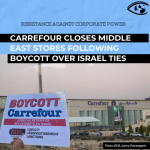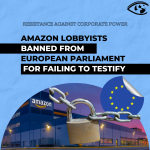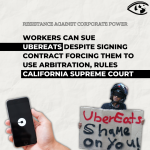EU: Boycott of American Goods Over Iraq War Gains Momentum
Berlin - No more Coca-Cola or Budweiser, no Marlboro, no American whiskey or even American Express cards -- a growing number of restaurants in Germany are taking everything American off their menus to protest the war in Iraq.
Although the protests are mainly symbolic, waiters in dozens of bars and restaurants in Hamburg, Berlin, Munich, Bonn and other German cities are telling patrons, "Sorry, Coca-Cola is not available any more due to the current political situation."
The boycotts appear to be part of a nascent worldwide movement. One Web site, www.consumers-against-war.de, calls for boycotts of 27 top American firms from Microsoft to Kodak while another, www.adbusters.org, urges the "millions of people against the war" to "Boycott Brand America."
Consumer fury seems to be on the rise. Demonstrators in Paris smashed the windows of a McDonald's restaurant last week, forcing police in riot gear to move in to protect staff and customers of the American fast-food outlet. The attackers sprayed obscenities and "boycott" on the windows.
In Indonesia, Iraq war opponents have pasted signs on McDonald's and other American food outlets, trying to force them shut by "sealing them" and urging Indonesians to avoid them.
In the Swiss city of Basel, 50 students recently staged a sit-down strike in front of a McDonald's to block customers' entry, waved peace signs and urged people to eat pretzels instead of hamburgers.
Anti-American sentiment has even reached provinces in Russia, where some rural eateries put up signs telling Americans they were unwelcome, according to an Izvestia newspaper report.
A German bicycle manufacturer, Riese und Mueller GmbH, canceled all business deals with its American suppliers.
"Americans only pay attention when money is on the line," director Heiko Mueller told Reuters, whose firm buys $300,000 worth of supplies from half a dozen American firms each year.
"We wanted to make a statement against this war and told our American partners that unless they renounce what their government is doing we won't do any business with them anymore."
Small But Symbolic
The German restaurant boycotts of American products started small but spread rapidly after the Iraq war began on Thursday. The conflict has struck a raw nerve in a country that became decidedly anti-war after the devastation of World War II, which it initiated.
"If people all around the world boycott American products it might influence their policies," said Jean-Yves Mabileau, owner of "L'Auberge Francaise" which joined 10 Hamburg restaurants in banning Coca Cola, Philip Morris' Marlboro cigarettes, whiskey and other American goods.
"This started as a light-hearted reaction to Americans dumping French wine in the gutter and renaming 'French Fries' as 'Freedom Fries'," he said. "But it feels good to take a stand against this war. It is just a small gesture, but a good one."
Diners at the Osteria restaurant in Berlin are finding that "things go better without Coke" and are ordering Germany's long overshadowed imitation of "the real thing" -- the slightly sweeter "Afri-Cola" -- to express their outrage.
"We wanted to do something to express our annoyance," Osteria owner Fabio Angile told Reuters. "We want to hit America where it hurts -- in their wallets. None of the customers have complained. On the contrary, most thought it was a great idea."
Herve Keroureda, owner of a French restaurant in Hamburg known as "Ti Breizh," said he was astonished by the massive media coverage of their small-scale anti-American protest.
"It was only intended as a small gesture but has turned into a gigantic issue," he said. "And the reaction from the patrons has been tremendous. Most have called it a brilliant idea."
In Bonn, bartender Bruno Kessler said he was refusing to sell American whiskey or American beer such as Anheuser-Busch's Budweiser at his "Eifeler Stuben."
"I asked myself 'What can I possibly do to show my anger over this barbary?'," he told Germany's N-24 television network.
Starbucks, Big Macs Avoided
Sarah Stolz, a 22-year-old German student of American studies, was headed for a Starbucks, coffee shop in central Berlin when her anti-war conscience got the best of her.
"I was thinking about going into Starbucks which I love, when I realized it was wrong," she said. "I'm backing the boycott because the war is totally unjustified."
Rita Marschall was avoiding McDonald's and Burger King.
"I'm boycotting American products because their policy on Iraq is totally wrong," said Marschall, 26, in front of a Berlin McDonald's. "It's just one of many ways we can take a stand."
Some German bakeries have renamed a local cake known as "Amerikaner" -- a disk-shaped pastry with icing on top -- as "Peace-ies," bearing a peace sign piped in chocolate sauce.
The boycotts are having only a negligible business impact. Establishments often associated with the American way of life such as Starbucks, Dunkin' Donuts, McDonald's and Coca-Cola reported no major business impact from the protests. Dunkin Donuts is owned by Britain's Allied Domecq
"We're really a local business in Germany, the product is made in Germany and they're boycotting German products," said Jonathan Chandler, communications director for Coca-Cola Europe, Eurasia and the Middle East in London.
Chandler declined comment on whether it was hurting sales, but an industry source said any impact would not be serious.
A spokeswoman for McDonald's in Europe said there had been no discernible impact on sales from the actions, and described the attack on the Paris restaurant as "an unfortunate incident during a protest."
"As a global entity, McDonald's is just a brand," she said. "Most of the restaurants are local franchises and support their local community. So why do they attack McDonald's? If you get a good answer please let me know."
In the London suburb of Milton Keynes, the Greens party have called on consumers to boycott 330 American products ranging from Mars bars to Gap jeans and American films on DVD and video.
In Zurich, travel agents said some clients who usually take holidays in the United States are changing their destinations.
"Some of the most loyal customers who have been traveling to the United States for years have changed their plans because they don't like what Bush is doing," Lucia Zeller, director of the Travac travel agency, told the Tages Anzeiger newspaper.
- 189 Retail & Mega-Stores



